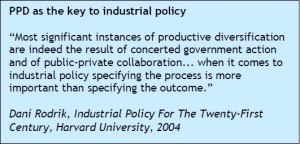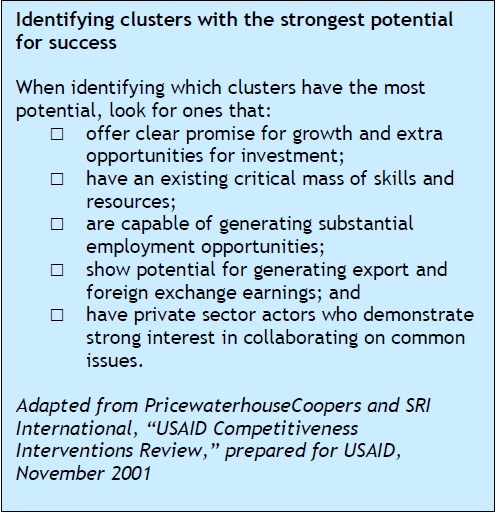The issue: It makes natural sense for dialogue to arise between a particular industry, cluster or valuechain in the private sector and those in government responsible for regulating that area of the economy – many theorists believe that promoting clusters plays a major role in improving competitiveness. But these sector-specific dialogues present their own particular opportunities and threats.
Sector-specific or issue-specific public-private dialogues should be encouraged because they provide more focus, greater incentive to collaborate, and more opportunity for action.
- To tackle the risk of missing the big picture, sector-specific dialogues should be linked to a broader, cross-cutting dialogue process.
- The choice of sectors to involve in dialogue can be controversial, especially where institutions are weak. This can be mitigated by a transparent process.
- Dialogue works best with the sectors most willing to invest time and resources – though this requires safeguards against unfairly favoring already strong sectors.
- Rent-seeking activity is more of a risk in sector-specific dialogue.
- This can be mitigated by greater transparency, explicit enunciation of intended outcomes, and an inclusive approach that creates open access for all stakeholders with an interest in the sector’s or cluster’s value chain.
C.9.1. Getting the PPD process right is key to sector-led growth
Harvard economist Dani Rodrik advocates14 that PPD has a crucial role to play in identifying opportunities to promote competitiveness through a sector-specific approach. He argues that history shows neither exclusive state planning nor unfettered enterprise work at promoting competitiveness – what is needed are collaborative efforts between government and the private sector to identify opportunities and devise strategies.
In this context, devising effective PPD mechanisms is the key starting point for successful industrial policy. Rodrik describes how public-private “deliberation councils” should work:
“They would be the setting in which private-sector interests would communicate their requests for assistance to the government, and the latter would goad the former into new investment efforts.
“These councils would seek out and gather information (from private sector and elsewhere) on investment ideas, achieve coordination among different state agencies when needed, push for change in legislation and regulation to eliminate unnecessary transaction costs or other impediments, generate subsidies and financial backing for new activities when needed, and credibly bundle these different elements of support along with appropriate conditionalities.”
C.9.2. Local ownership and leadership are key in sector-specific dialogue
Donor experience of attempting to promote competitiveness through clusters generally suggests that it is difficult to “pick winners.”
Local ownership, in particular the existence of strong private sector champions, has usually proved to be the key determinant of success. The absence of emerging private sector champions is generally a sign that a cluster will fail to progress regardless of outside assistance.
C.9.3. Start by holding participatory workshops open to all interested parties
The best way to start exploring the potential for cluster-based PPD is to hold a series of participatory workshops to discuss cluster strategy. These workshops should be open to all actors in the sector value chain – enterprises, trade associations, related educational and financial institutions, labor unions, and public sector agencies. They should be accompanied by a communications and outreach strategy to raise awareness.
Such a series of workshops could productively be linked to a competitive bidding process for financial assistance packages for cluster development.
Potential for PPD is highest in sectors where these workshops are characterized by broad participation and sustained engagement, a general willingness to listen to all views, and the emergence of credible champions from both public and private sectors.
Successful PPD is likely to be less easy to foster when these workshops are characterized by attendance that appears to represent a narrow clique, domination of the discussion by a few voices, or tensions and personal animosities.
C.9.4. Changing private sector mindset is especially important in sector-based dialogue
Because many firms in sector-specific dialogue will be in direct competition with each other, extra effort often needs to be made to persuade the private sector that it makes sense for them to cooperate to resolve common problems. See the section on outreach and communications for ideas on strategy.
Improving the quality of private sector input into public sector decision-making – always an aim of PPD – is especially challenging and worthwhile in sector-specific dialogue, as a competitive mindset that characterizes clusters may translate into greater scope for rent-seeking activities.
The aim is to foster a forward-looking private sector mindset that perceives common opportunities across a cluster. Experience backs up the common-sense inference that this is more difficult to achieve in long-established industries.
Often, it is necessary to fight another mindset. It is not uncommon that the private sector assumes a passive attitude, expecting the government not only to lead the clustering effort, but also to provide the necessary ideas, funds, and resources. This attitude works against the need to develop process ownership by all those involved. Even worse, making the whole process dependent on government imperils continuity because of the transient nature of public administrations. In contrast, a successful formula is to insure that as beneficiary of the process, the private sector assumes as well the roles of ‘author’ of the strategies and implementer (“actor”) of the corresponding actions.
- They are part of a broader, concerted government effort to improve competitiveness.
- They have broad membership, rarely excluding foreign-owned or small companies.
- Around five-sixths have an articulated vision. Over two-thirds have quantified targets.
- Financing changes over time – initially government often plays a leading role, with membership fees becoming more important in later stages.
Adapted from the Cluster Initiative Greenboko, Orjan Solvell, Goran lindqvist, Kristian Ketels, Cluster-research.org, 2003
C.9.5. There are several dangers in having PPD based on too few sectors
Involving too few sectors makes it more difficult for PPD to have impact on cross-cutting issues, which in turn increases the risk of over-specialization, over-reliance on previously successful models, and a lowered ability to perceive and capitalize on new opportunities.
It is worth making the effort to foster PPD in several parallel sectors and building cross-cutting PPD mechanisms from these sectoral dialogues.
C.9.6. Donors can be especially helpful in international benchmarking and technical training
The same issues arise with donor inputs into sector-specific dialogues as into PPD in general – see point 12 for a broader discussion of donor role. But donor inputs which can be especially valuable in sector specific dialogue include international market and policy research and benchmarking, and specialized technical training and assistance.


